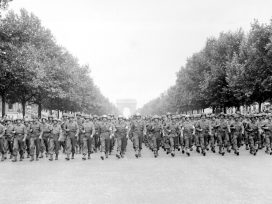
Since the collapse of Novi Sad’s train station in November, student-led protests have erupted across Serbia, inspiring a nationwide movement against corruption.
Eurozine has expanded the scope for bringing together intellectuals from eastern and western Europe – a concern as relevant today as it was directly after 1989, writes Transit managing editor Klaus Nellen.
“Poland, that is to say, nowhere”
Alfred Jarry, Ubu Roi
After the Yalta Conference, eastern European countries were subsumed under the term “Eastern Bloc” and quickly disappeared from the western field of vision. In the West, the political division of Europe was accepted as eternal: Yalta seemed to be the a priori not only for politics, but also for history-writing and aspirations for the future.
The events of 1989 swept this order aside: what for so long had been deemed unalterable revealed itself to be a monstrous anachronism. The continuum of postwar history had been exploded: Europe had re-entered history, relationships that had been broken since 1945 reappeared. With the rediscovery of Europe and the reappropriation of a shared history and future, Europeans had to re-invent themselves. Transit wants to offer a medium for this process. It is published by the Institute for Human Sciences (IWM), founded in Vienna in 1982 as a place for academics and intellectuals from both halves of Europe to meet and exchange ideas freely. That was and still is also the idea behind Transit.“The Iron Curtain has disappeared,” ran the editorial to the first issue published in autumn 1990, “but not the traumata that the political division of Europe has wrought upon the continent: a complex network, with its differences and tensions, was cut to pieces; intellectual circulation between western and eastern Europe was interrupted. The western half repressed or dismissed this loss, while the eastern half remained painfully aware of it. What is certain is that for a long time to come, Europeans will have to live with the asynchronies, the different experiences, understandings, values and attitudes that the division of Europe has created.” The intellectual milieus in the West and the East had become alienated from one another. Yet, we asked, might not this also represent an opportunity? Might not differences in thought and experience provide an opportunity for mutual revision, productive irritation?
Eurozine has expanded enormously the scope available to Transit for bringing together intellectuals from the East and the West. When Transit was first invited to attend the European Meeting of Cultural Journals in 1995, it also acted as co-organizer with Wespennest. The Vienna meeting marked a double caesura: it was the first time that eastern European journals had been invited in a systematic way and it was also the year that the www made its breakthrough. The idea was floated to use the new medium to strengthen the network.
At the latest with the EU enlargement in 2004 it became painfully apparent how much the Union lacks a comprehensive, European-wide public sphere. Eurozine has become a small model for that. For Transit, Eurozine was the logical progression in stepping up exchange between Europeans: for journals like ours, particularly in eastern Europe, Eurozine offered the chance to contribute to the self-understanding of a Europe in change.
In concrete terms: Transit articles taken by Eurozine and translated into other languages not only reach a much wider, international readership; they also, as a result of contextualization, obtain significant added value. One example: the politics of memory is a topic that has interested us from the outset, from Transit 2 (1991, “The return of history”) to Transit 35 (2008, “European memory politics”). Thanks to the publication of key contributions in the Eurozine focal point “European histories”, the debate conducted in our journal has attained a European dimension.
Today, after almost twenty years, the historically contingent differences between “eastern” and “western” Europe are still there, while new ones have emerged from them. The EU accession of the “new” European countries has done little to alter this – on the contrary, the resulting tensions with “old” Europe have become clearer. For that reason, it is all the more important to have media such as Eurozine where such issues can be discussed.
Published 24 September 2008
Original in English
© Klaus Nellen / Eurozine
PDF/PRINTSubscribe to know what’s worth thinking about.

Since the collapse of Novi Sad’s train station in November, student-led protests have erupted across Serbia, inspiring a nationwide movement against corruption.

The Second World War no longer serves as a history of the western European present. The current era is marked by a different set of problems, not least the fading appeal of the model of democracy installed after 1945.